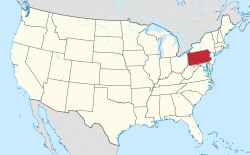Lower Macungie Township, Pennsylvania
| Lower Macungie Township | |
|---|---|
| Township | |

A farm in Hilltop Road in the township
|
|
 Location of Pennsylvania in the United States |
|
| Coordinates: 40°32′51″N 75°33′58″W / 40.54750°N 75.56611°WCoordinates: 40°32′51″N 75°33′58″W / 40.54750°N 75.56611°W | |
| Country | United States |
| State | Pennsylvania |
| County | Lehigh |
| Area | |
| • Total | 22.46 sq mi (58.18 km2) |
| • Land | 22.35 sq mi (57.88 km2) |
| • Water | 0.12 sq mi (0.30 km2) |
| Elevation | 417 ft (127 m) |
| Population (2010) | |
| • Total | 30,633 |
| • Estimate (2016) | 31,964 |
| • Density | 1,430.35/sq mi (552.26/km2) |
| Time zone | EST (UTC-5) |
| • Summer (DST) | EDT (UTC-4) |
| Area code(s) | 610 |
| FIPS code | 42-077-44952 |
| Website | www |
Lower Macungie Township is a township in Lehigh County, Pennsylvania, in the United States. It is a suburb of Allentown, Pennsylvania, in the Lehigh Valley region of the state. As of the 2010 Census, the township had a population of 30,633.
Lower Macungie is the fastest growing area of Pennsylvania in terms of total population growth and is undergoing rapid suburbanization. Some fast-growing areas of the township include Ancient Oaks, Brandywine Village, Brandywine Village 2, Hills at Lock Ridge, Millbrook Farms, and Shepherd Hills. Its villages include East Texas, Minesite, New Hensingersville (also in Berks County), Weilersville, and Wescosville.
Lower Macungie Township's growth has been attributed to its proximity to major employment centers, and strategic access to major transportation corridors. At 22.6 square miles, the Township is one of the largest municipalities in the Lehigh Valley.
Before European settlement, the area that now includes Lower Macungie Township was inhabited by people who called themselves the Lenni Lenape. They hunted here, and are known to have had a few small seasonal villages and jasper workshops close to streams and springs. Jasper from their quarries outside present-day Macungie and Vera Cruz was traded far and wide across North America.
The name “Macungie” is derived from a Native American word meaning bear swamp, or place where bears feed. The early Pennsylvania German settlers took land that had been hunting grounds for the Lenni Lenape, adopting the Lenape name for the area. They cleared the scrub and forests, planted crops, raised livestock, and continually expanded their holdings. Most of what they produced fed their families and their hired and indentured servants, but some crops were grown for their cash value. Eventually they raised enough money to buy land warrants in Philadelphia from the proprietors, William Penn’s heirs. The Rodale Organic Gardening Experimental Farm was added to the National Register of Historic Places in 1999.
...
Wikipedia
